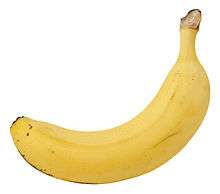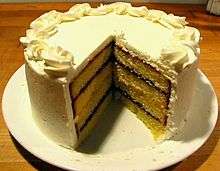Banana cake
Banana cake is a cake prepared using banana as a primary ingredient and typical cake ingredients. It can be prepared in various manners, such as a layer cake, as muffins and as cupcakes. Steamed banana cake is found in Chinese, Indonesian and Vietnamese cuisine.[1][2][3]
.jpg)
Preparation
Banana cake is prepared using banana as a primary ingredient and typical cake ingredients such as flour, sugar, eggs, butter, margarine or oil and baking soda.[4][5][6][7] The bananas can be mashed or puréed using a food processor or electric mixer and mixed into the cake batter,[4][5] and the cake can also be topped or garnished with sliced bananas.[5] Banana cake may be prepared as a use for browned or overly-ripe bananas.[4][6] Chocolate may be used as an ingredient,[8] which along with the banana is an enjoyable flavor combination for some people.[5] Nuts such as walnuts and macadamias may be used in the batter[9][10] and to top and garnish the cake.[9]
An icing or glaze may be used in the cake's preparation,[5] which can include alcoholic beverages such as bourbon in it.[9] Banana cake can be baked, and also prepared as a steamed cake, for which a food steamer may be used.[5][6] Banana cake may have a moist texture.[7] It can be prepared as a layer cake,[5][9] and the cake batter can be used to prepare banana muffins and cupcakes.[7][11] It can be prepared as a vegetarian dish and as a low-fat dish.[8]
- Banana cakes
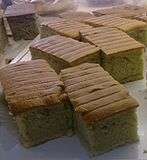 Slices of banana cake
Slices of banana cake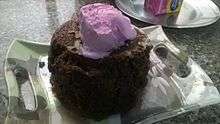 A chocolate banana cake garnished with strawberry ice cream
A chocolate banana cake garnished with strawberry ice cream A banana cake garnished with sliced banana
A banana cake garnished with sliced banana
Types
In Chinese cuisine
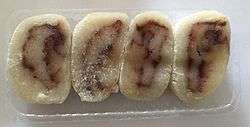
In Chinese cuisine, banana cake is a type of gao, which refers to steamed, flour-based cakes.[1] Chinese gao is typically served along with meals or between meals with tea, and is typically not served as a dessert.[1]
Bánh chuối
Bánh chuối is a Vietnamese banana cake or bread pudding.[3] The cake is typically steamed, and the bread pudding may be baked.[3]
Kue nagasari
Kue nagasari is a popular Indonesian steamed banana cake that can be prepared using banana, mung bean flour or rice flour, coconut milk and sugar.[2][12]
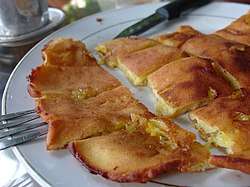 Bánh chuối prepared in the style of a pancake
Bánh chuối prepared in the style of a pancake- Unwrapped kue nagasari
See also
- Banana bread
- Banoffee pie – An English pie prepared using bananas
- List of cakes
- List of banana dishes
References
- Tropp, B. (1982). The Modern Art of Chinese Cooking. Cookbook Library. Morrow. p. 518. ISBN 978-0-688-00566-5.
- Long, L.M. (2015). Ethnic American Food Today: A Cultural Encyclopedia. Ethnic American Food Today. Rowman & Littlefield Publishers. p. 294. ISBN 978-1-4422-2731-6.
- Le, H. (2014). Vietnamese Food with Helen's Recipes:. Createspace Independent Pub. pp. 158–161. ISBN 978-1-5005-2971-0.
- Greenspan, D.; Richardson, A. (2006). Baking: From My Home to Yours. Houghton Mifflin. p. 204. ISBN 978-0-618-44336-9.
- Reisman, R. (2002). The Complete Idiot's Guide to Light Desserts. Complete Idiot's Guide to. Alpha Books. pp. 38–39. ISBN 978-0-02-864446-2.
- Mahunnop, W. (2013). 25 Delicious Banana Recipes. JustZen. p. 18.
- Paré, J. (2002). The Rookie Cook. Company's Coming. Company's Coming Publishing, Limited. p. 146. ISBN 978-1-895455-92-2.
- Moll, Lucy (January 1993). "A Better Banana Cake". Vegetarian Times (185): 22.
- Brass, M.; Brass, S.; Ryan, A. (2015). Baking with the Brass Sisters. St. Martin's Press. pp. 64–66. ISBN 978-1-250-06435-6. Retrieved April 20, 2016.
- Heldstab, Celeste (2005). The Kitchen Grimoire Volume 4. Celeste Heldstab. p. 402. ISBN 978-0-9774722-3-9.
- Koch, M.; Legato, S. (2012). Eat More of what You Love. Running Press. p. 322. ISBN 978-0-7624-4589-9.
- Von Holzen, H.; Hutton, W.; Arsana, L. (1999). The Food of Indonesia: Authentic Recipes from the Spice Islands. Periplus World Food Series. Periplus Editions. p. 114. ISBN 978-962-593-389-4.
Further reading
- Shi, J.; Shahidi, F.; Ho, C.T. (2005). Asian Functional Foods. Nutraceutical Science and Technology. CRC Press. pp. 116–117. ISBN 978-1-4200-2811-9.
External links

